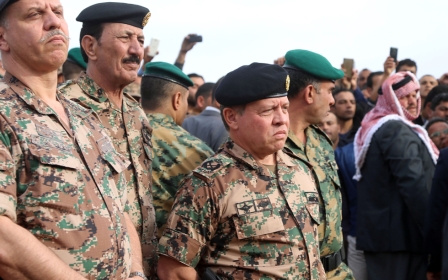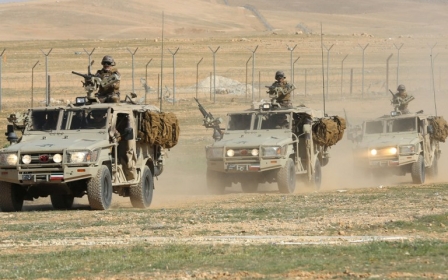British special forces 'operating alongside rebels in Syria'

British special forces are reported to be operating alongside Syrian opposition rebels facing daily attacks by Islamic State (IS) group militants near the Jordanian border, the Times newspaper reported on Monday.
According to a commander of the New Syrian Army (NSA), a unit made up of former Syrian special forces soldiers, the British troops crossed from Jordan to help with reconstructing defences in the village of al-Tanf after a wave of IS assaults.
“They helped us with logistics, like building defences to make the bunkers safe,” First Lieutenant Mahmoud al-Saleh said. “They [IS] attack us at all times, 3am, 5am, 4pm, 11pm.
“If you look at the timing of the assaults it’s clear they don’t want us to get any rest. They’re using missiles, mortars and many suicide bombers.”
Last month, at least 11 NSA fighters were killed in a vehicle-borne suicide attack at the unit’s base in al-Tanf.
The report offers the latest evidence that British special forces are more closely involved on the ground in the fight against IS than the British government has publicly acknowledged, as first reported by Middle East Eye in March.
Jordan’s King Abdullah revealed that two battalions of opposition Syrian special forces troops operating against IS had been trained in Jordan and assessed by British in a briefing to US congressional leaders in January, MEE reported.
British SAS solders have also been operating alongside Jordanian special forces battling IS in Libya, prompting concerns in the UK that the government was using different deployment rules for special operations forces to conceal deployments from parliamentary scrutiny.
Special forces deployments do not require British parliamentary approval, unlike the deployment of regular armed forces.
Last week, British Defence Minister Michael Fallon told parliament that the government was not planning any kind of combat role for either troops or the Royal Air Force in Libya just two days before further reports emerged of SAS soldiers fighting IS alongside armed groups from Misrata.
In comments to MEE, Crispin Blunt, the current chairman of the Commons foreign affairs committee, urged the government to be more transparent about special forces deployments against IS across the region.
“The longer it goes on you can’t keep these things secret forever,” he said.
“If you’re running a strategy and you’re using special forces to do it – and you’re doing it over a prolonged period – you’ll get into the position we’re getting into now, which is that there is a consistent pattern of open source reporting on it.”
The Ministry of Defence has not commented on the role of British special forces in Syria or Libya.
Last year British Prime Minister David Cameron announced plans to expand the UK’s special forces capacity as part of a £2bn additional investment in military spending specifically aimed at tackling IS.
Speaking on BBC radio on Monday, Sara Elizabeth Williams, the author of the Times story and an MEE contributor, said that British special forces were based alongside American special forces in "add-on American facilities" adjacent to a Jordanian military base near where the Jordanian, Iraqi and Syrian borders meet.
The area also houses a refugee settlement from which journalists are barred, Williams said.
"There are drones and various other things up there that the military don’t want in the public sphere," Williams said.
Williams said that Saleh, the NSA commander, had been at the base when she spoke to him on the telephone and that she could hear English being spoken in the background.
Asked how he knew that the special forces soldiers at the al-Tanf base were British, Williams said that Saleh had replied: "Because they trained us, and because they introduced themselves as British special forces."
Middle East Eye propose une couverture et une analyse indépendantes et incomparables du Moyen-Orient, de l’Afrique du Nord et d’autres régions du monde. Pour en savoir plus sur la reprise de ce contenu et les frais qui s’appliquent, veuillez remplir ce formulaire [en anglais]. Pour en savoir plus sur MEE, cliquez ici [en anglais].




